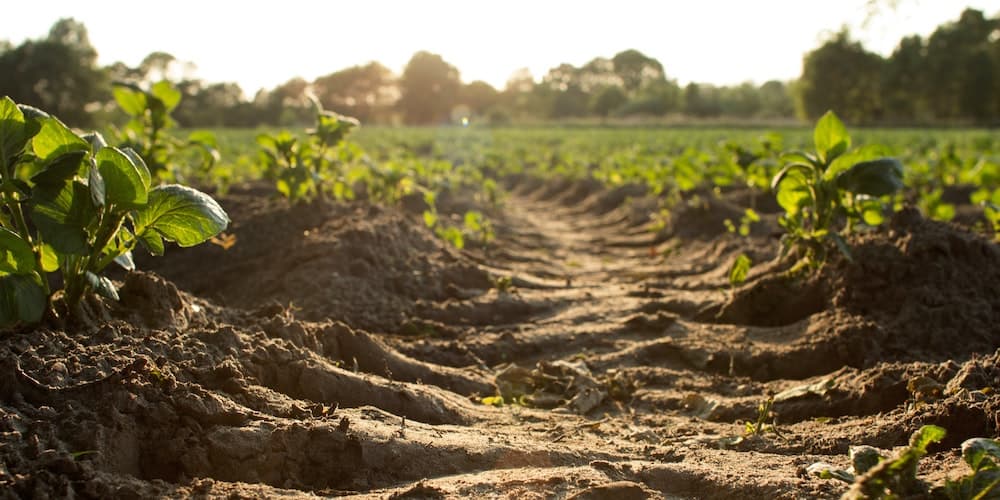I have had the joy of working for ten years in the fertile landscape of organic farming
I say ‘la bio’ and not ‘le bio’ because we are clearly talking about agriculture, which is feminine! But also about philosophy and ethics. The pioneers sometimes told me how they once endured disdain, even malice: in the 1970s and 1980s, organic was a brilliant, controversial, and misunderstood niche. The extent and severity of pollution were little known, resources seemed infinite, scandals in the food sector were yet to come, people had not fully taken on the — fundamental — question of their health (survival?) and that of their children.
Today the organic sector is flourishing; it has grown and blossomed, conquering a lot of land, many hearts and just as many stomachs. It is far from perfect and complete, but it inspires and has nothing left to prove.
Pioneers are proud, organic stores remain busy, the scientific studies demonstrating its benefits keep appearing, seeds are being sown again, old varieties are being revitalized, the young shoots of organic farming are multiplying, the cuisine is being renewed, winemakers are getting involved, and ministers are still trying to understand it.
I’m committed to organic
I often say it upfront, to answer critics who will say I am biased. Yes, I am biased; I love the values that organic farming represents, I love the men and women who produce it and embellish it, I love its pioneering, joyful, and committed character. I have sometimes defended organic farming when it was attacked over its real agronomic and nutritional benefits; I have often detected in these attacks, though pertinent, a certain ingratitude. Yes, organic farming is not perfect, but perhaps we should start by praising what it does better: the doors it opens, the inspirations it offers, and the necessary and profound transformations it drives in our society.
A systemic and ecological vision
From land-based organic farming and organic soil, I moved, through my work as a CSR and ecology consultant, to a form of ‘organic in business’ and ‘organic organizations.’ From the health of soils, landscapes, plants, animals, and farmers (both men and women), I moved to the health of employees, shared spaces, projects, products, and meetings.
I have always thought that the organic sector could not be satisfied with the (considerable) efforts of farmers.
And that the entire sector had to climb onto the same ridge, beautifully marked by the four founding values, of urgent relevance: equity, precaution, health, ecology — and on which we can linger.
An an overarching, pioneering, and ambitious raison d’être
Organic farming, from its inception, positions itself as an ecological alternative to chemical and polluting agriculture. The latter’s project is primarily focused on quantity (how to produce the maximum at the lowest cost), whereas organic farming aligns from the outset with an overarching purpose — pioneering and ambitious: to feed people while caring for their health AND that of the planet. This original purpose strongly recalls the three ethics of permaculture, an ecological movement born in the 1970s that continues to grow: care for the earth, care for people, and fair sharing.
In 1972 (the very year the famous Meadows report was published, warning us about the limits to growth), four founding principles were therefore stated by IFOAM, which demonstrated organic agriculture’s unprecedented ability to link major contemporary challenges : health, equity, ecology, precaution.
- The principle of health: to support and improve the health of the soil, plants, animals, people, and the planet, recognizing them as one and indivisible.
- The principle of ecology: be based on cycles and living ecological systems, align with them, imitate them, and help them persist.
- The principle of equity: be built on relationships that ensure equity with respect to the shared environment and life opportunities.
- The precautionary principle: to act in a careful and responsible way to protect the health and well-being of present and future generations, as well as the environment.
An regulation and a necessary impoverishment
In 1992, the first European regulation on organic farming had the merit of standardizing practices and offering a common language. It enabled organic farming to become the most regulated and most trustworthy food sector.
It brings together all national labels (including the national AB mark, which 97% of French people recognize and whose protection and defense is ensured by the INAO) under a single umbrella: the European label, also called the ‘Euro-leaf.
Thus the national AB label, like other labels from European countries, is today equivalent to the European label.
It is also a first form of simplification and impoverishment of organic criteria that inevitably opens the way to a two-tier organic system :
– the one that confines itself strictly to compliance with regulations (and their countless exemptions), the one that some call “bio-intensive”,
-the one that continues on the path, that questions, that progresses, that dares, that is the soul of organic farming, that is nourished by founding values and for whom compliance with the regulations is only a necessary formality or, to put it another way: the first stage of the rocket.
Organic agriculture has opened a new path.
It has proven to be a science far more respectful than conventional agriculture, whose devastations at all levels (soil health, landscapes, farmers, consumers) are increasingly documented. It aims to stay as close to nature as possible. It is one of the main sources of inspiration for the transition to the agriculture of tomorrow that we are all waiting for: a forest-based, biomimetic, solar and post-oil agriculture!
Many organic farmers and companies continue down this path. They know that processing and/or selling organic products is a huge step forward for health, soil life and the common good. But they know that it is not enough.
That we must always go further along the ridge.
Other agricultural quality labels….
In the wake of organic farming, other agricultural initiatives exist but none can boast the organic control system: biodynamics, which plays even more with nature’s cycles and soil regeneration, Label Rouge – which offers superior-quality products but with specifications less demanding than the organic label, the Bleu-Blanc-Coeur label – a private label more focused on the nutritional aspect.
Note that permaculture, an advanced agronomy closely followed by INRA, currently does not have any label.
And CSR labels in companies
Some organic companies also adopt a sectoral CSR label, called Bioentreprisedurable. They work at all levels: reducing the impacts of industrial pollution, workplace well-being, gender equality, diversity, collective intelligence, and consumer awareness. They aim to reduce their negative impacts on nature and even to create positive ones.
They work on the economy of functionality (substituting the sale of a good with the sale of a service) and the circular economy (using other people’s waste as raw material).
They seek to create a virtuous circle of freedom, responsibility, trust and initiatives. They understand the vital need to open their borders: their membranes then become surfaces for exchange like living cells, in order to capture energy and innovations on the margins. In the same way that in a field a farmer brings back from the edge, the ditch or the hedgerow a variety that interests them — unique and adapted to their terroir.
The benefits of these CSR approaches CSR (Corporate Social Responsibility) that extend the original organic project are numerous within the company (engagement, cohesion, performance, risk management, joy at work, etc.), as well as outside (meeting customer expectations, quality, reputation, respect for nature, awareness-raising, etc.). These strengths nourish each actor at their own scale and enable these companies to offer the best of organic while respecting nature, people, the soil and future generations.
Therefore, each person must take responsibility and choose, according to their means and desires, to support the farming systems and companies most respectful of life, not the most perfect, but the most inspiring for the ecological transformations we need to initiate together today.
Sources and recommended reading for further study
« Organic farming: an asset for the climate », Note from Agence Bio, 06/08/15
« What contribution can French agriculture make to reducing greenhouse gas emissions? » July 2013, INRA
Study by FIBL « Organic farming and biodiversity »: https://www.fibl.org/fileadmin/documents/shop/1547-biodiversite.pdf
CNRS study on biodiversity: http://www.cnrs.fr/cw/dossiers/dosbiodiv/?pid=decouv_chapC_p5_d1&zoom_id=zoom_d1_2
Que Choisir / October 2016 issue
Quantification and economic valuation of the externalities of organic farming – INRA & ITAB Report
Lairon, D. (2009). The quality of organic agricultural products. Innovations Agronomiques, 4, 281-287
« Organic Production Enhances Milk Nutritional Quality by Shifting Fatty Acid Composition: A United States–Wide, 18-Month Study », 2013
Book « Eating organic is better! New scientific evidence to support it », Claude Aubert, Denis Lairon, André Lefebvre, 2012
« Nutritional and health assessment of foods from organic agriculture », AFSSA, 2003
So, what do we eat? by Laurent Chevallier and Claude Aubert, Fayard, 2009
Michel de Lorgeril, Eating organic, a wise precaution. Le Monde, August 2009
Let’s lift the veil on lives shattered by pesticides. Le Monde, December 2016



